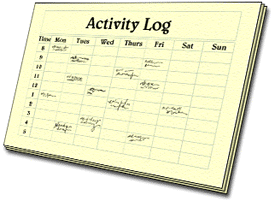How much time do you spend at work doing things that don't contribute to your success?
At first, you may say "not much." But – especially if you haven't used Activity Logs before – you may be surprised by how much more time you can find.
When you properly understand how you use your time at work, you can minimize or eliminate low value activities. This means that you can do more high value work, while still being able to leave the office at a sensible time.
So, how can you understand this? One useful way is to keep an Activity Log, and that's what we're looking at in this article.
About Activity Logs
An Activity Log (also known as an Activity Diary or a Job Activity Log) is a written record of how you spend your time.
By keeping an Activity Log for a few days, you can build up an accurate picture of what you do during the day, and how you invest your time. You'll find that memory is quite a poor guide, and that keeping the Log is an eye-opening experience!
Your Activity Log will also help you understand whether or not you're doing your most important work during the right time of day. For instance, if you're more energetic and creative in the morning, you'd be better off doing your most important work during this time. You can then focus on lower energy tasks, such as responding to emails or returning calls, in the afternoon.
Activity Logs are also useful for helping you identify non-core activities that don't help you meet important objectives. For example, you might spend far more time than you think surfing the Internet, or getting coffee each afternoon. When you see how much time you're wasting on such activities, you can then change the way that you work to eliminate them.
Tip:
Don't confuse Activity Logs with timesheets – these are used for reporting on your use of time, and for tracking the time you spend on a task or job.
How to Keep an Activity Log
To keep an Activity Log, download this template, or open up a new spreadsheet and set up the following column headers:
- Date/Time.
- Activity description.
- How I feel.
- Duration.
- Value (high, medium, low, none).
Then, without changing your behavior any more than you have to, note down everything that you do at work, as you do it.
Every time you change activities, whether replying to email, working on a report, making coffee, or gossiping with colleagues, note down what the activity is, the time of the change, and how you feel (alert, flat, tired, energetic, and so on).
Then, at a convenient time, go back through your Activity Log and write down the duration of each activity, and whether it was a high, medium, low, or no value task. (Evaluate this based on how far it contributed to achieving your job goals.)
Learning from Your Activity Log
Once you've logged your time for a few days, analyze your Activity Log. You may be alarmed to see how much time you spend doing low value jobs!
You may also see that you are energetic in some parts of the day, and flat in other parts. A lot of this can depend on how you are, the rest breaks you take, when and what you eat, and the work that you're doing.
Once you've analyzed your Activity Log, you should be able to boost your productivity by applying one of the following actions to various activities:
- Eliminate or delegate jobs that aren't part of your role, or that don't help you meet your objectives. These may include tasks that someone else in the organization should be doing (possibly at a lower pay rate) or personal activities such as sending non-work e-mails or surfing the Internet.
- Schedule your most challenging tasks for the times of day when your energy levels are highest. That way, your work will be of better quality, and it should take you less time to do. (Our article, Is This a Morning Task?, has more on how to discover your peak time of day.)
- Minimize the number of times you switch between types of task. For example, could you check and reply to e-mails at only a few times of the day, or process all of your invoices at the same time each week?
- Reduce the amount of time you spend on legitimate personal activities such as making drinks. (Take turns in your team to do this – it saves time and strengthens team spirit!)
Tip:
Sometimes, spending too much time on low-value or low-priority tasks can be a symptom of procrastination.
Key Points
Activity Logs are useful tools for analyzing how you use your time. They help you track changes in your energy, alertness and effectiveness throughout the day, and they help you eliminate time wasting activities, so that you can be more productive.
Once you've analyzed your Activity Log, you should be able to boost your productivity by eliminating or delegating low-value activities, scheduling challenging tasks for the time of the day when you feel your best, minimizing the number of times that you switch between types of tasks, and reducing the time you spend on personal activities.


